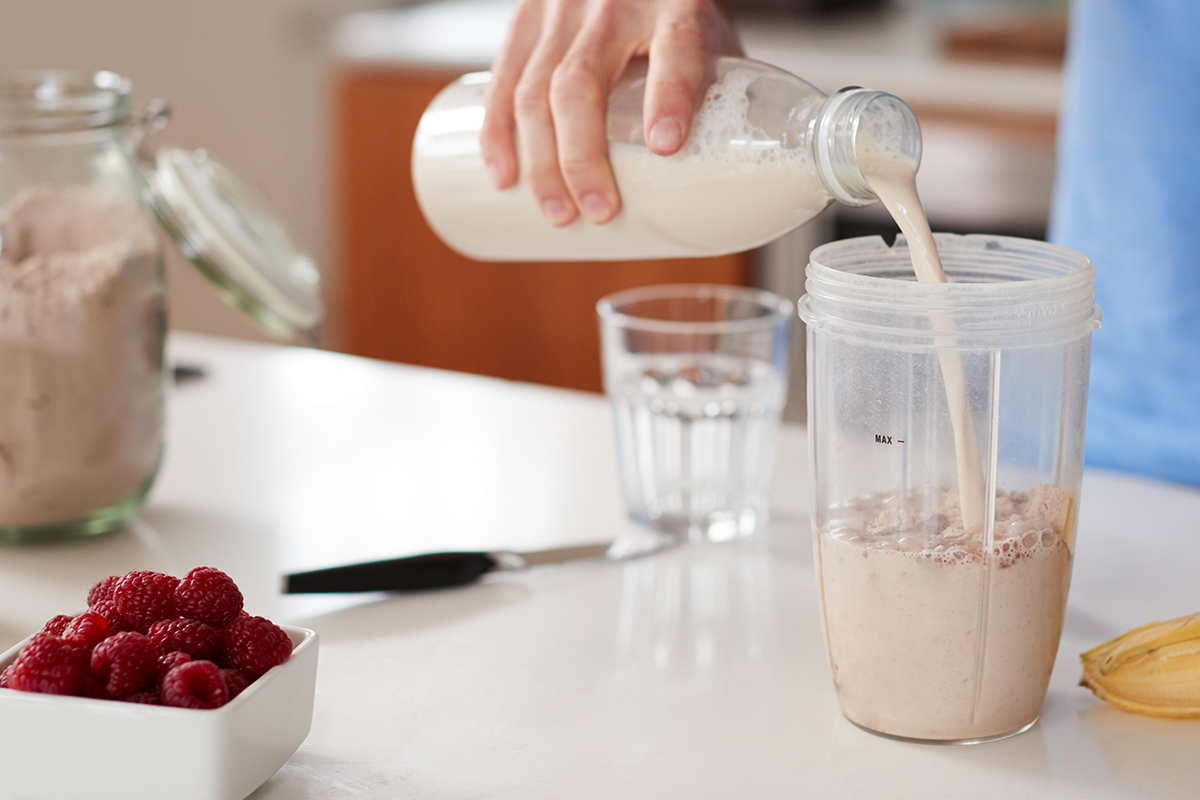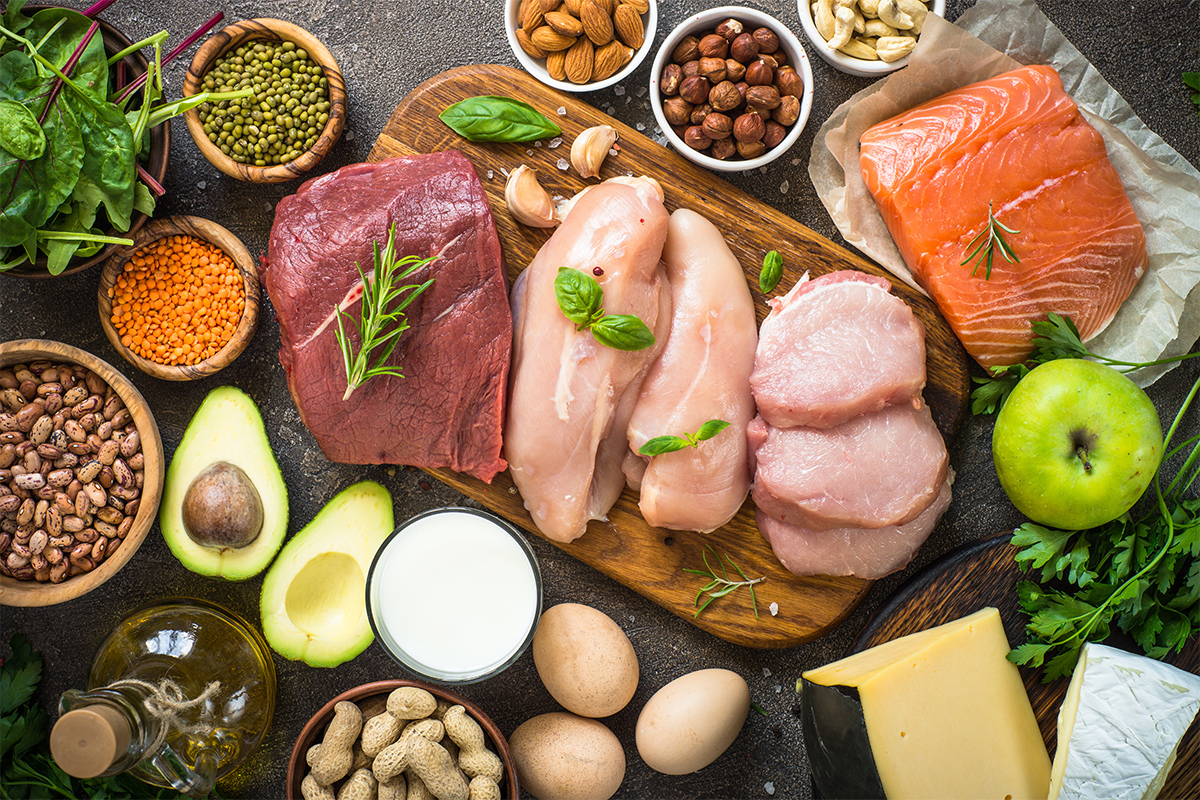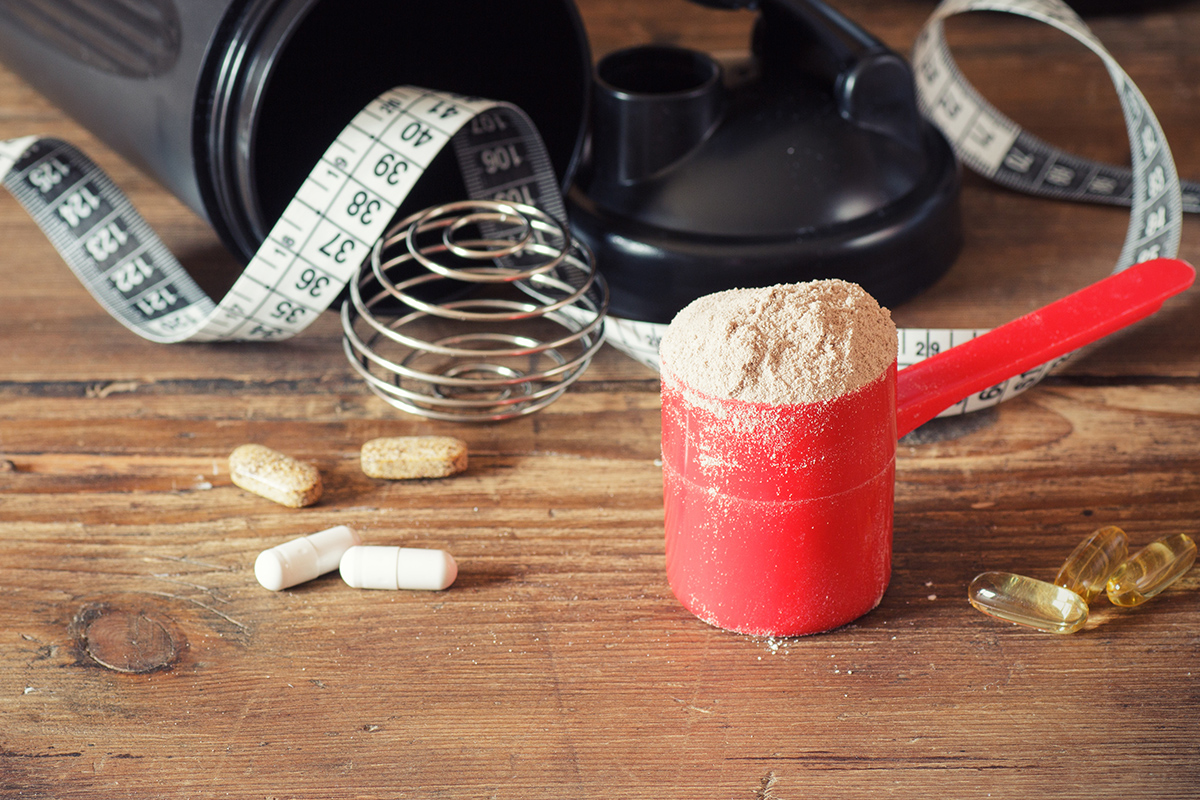How Much Protein Does Your Body Need?
One frequently asked question is about the recommended intake of protein. We hear you! Here is everything you need to know.

This is a popular question that often comes from people trying to bulk or maintain muscle mass, and even from people just looking to keep their bodies healthy. In general, if you are at a healthy weight and your exercise habits are minimal, your protein intake should sit somewhere in the range of 0.36–0.6 grams per pound (0.8–1.3 grams per kilogram).1 The lower end of this range is considered the Recommended Dietary Allowance (RDA), or the amount needed to meet a person’s basic nutritional needs. For men, this is approximately 56-91 grams per day; for women, it’s about 46-75 grams per day.1 However, you can calculate a more accurate number for your individual needs.
Despite the fact that we have some guidelines on how to determine your protein requirements, it really isn’t an exact science. Each individual should consult with a specialist to determine what is best for their body.
According to the recommendations above, the math behind this is quite simple. Let’s do a quick example to demonstrate how it’s done. Again, this is using the most basic protein recommendation.
If you are 130 pounds, if this is a healthy weight for you, and if your exercise habits are minimal, you would want to multiply by the lower end of the range we mentioned above (0.36 grams of protein per pound of bodyweight).
| 130lbs x 0.36g = 46.8g |
This quick calculation shows that your protein consumption should amount to approximately 47 grams of protein per day.
If you like, you can go a step further. Since protein has 4 calories per gram,2 you can multiply 47 by 4 to get the total number of calories you should consume from protein.
| 47g x 4 = 188 |
Now you know that 188 of your daily calories should come from protein.

Endurance athletes need significantly more protein than sedentary individuals, about 0.5-0.65 grams per pound of bodyweight (1.2–1.4 grams per kilogram).1
The calculation here would follow the same process, only you would replace 0.36 with a number within the new range. Of course, the more intense your endurance workouts are, the greater this number will be. Generally, a number within the range of 0.5 to 0.65 helps endurance athletes meet their protein requirements.
Let’s do a quick example using kilograms instead of pounds.
If you took your weight in pounds, you would first need to divide your weight by 2.2 to get your weight in kilograms. Let’s use 130 pounds again to demonstrate how this works:
| 130 ÷ 2.2 = 59.09 |
Next, multiply your weight in kilograms by a number within the new range. Keep in mind that this range changed too. It’s 0.5-0.65 grams of protein per pound, but 1.2-1.4 grams of protein per kilogram. Let’s use the lower end of the range which is 1.2.
| 59.09 x 1.2 = 70.91 |
This calculation shows that, if you are an endurance athlete, your minimum protein consumption should amount to approximately 71 grams of protein per day.

Athletes looking to increase muscle mass are advised to consume at least 0.55 and up to 0.91 grams of protein per pound of bodyweight (1.21-2.0 grams per kilogram).3 Athletes who strength train regularly (and at an intense level) need just a little bit more. The recommendation is at least 0.68 and up to 0.91 grams of protein per pound of bodyweight (1.5 to 2.0 grams per kilogram) every day.3

Older adults have increased protein needs as well, about 0.45–0.6 grams per pound of bodyweight (1–1.3 grams per kilogram).1 According to our registered dietitian, the increased intake recommendation is partly to help maintain lean mass and partly to compensate for a slightly diminished ability to digest and absorb protein.2 Healthline explains that increasing protein can also help prevent osteoporosis in older adults.1

People recovering from serious injuries may also need more protein. The assumption is that, because traumatic injury induces hypermetabolism, protein requirements increase.4 While more work needs to be done to develop accurate energy requirements, some suggest that about 0.68 grams of protein per pound of bodyweight (1.5 grams per kilogram) is an appropriate amount.4

A 2015 study found that the recommended protein intake for pregnant women is in fact lower than previously thought. Still, the overall amount is similar to the needs of a high performing endurance athlete! According to this study, these are the appropriate amounts of protein for the average pregnant woman:
During Early Pregnancy – 0.55 grams of protein per pound of bodyweight (1.22 grams per kilogram).
During Late Pregnancy – 0.69 grams of protein per pound of bodyweight (1.52 grams per kilogram).
The short answer is yes. According to a review from the International Journal of Sport Nutrition and Exercise Metabolism, the maximum safe protein intake is 1.14 grams of protein per pound of bodyweight, or 2.5 grams of protein per kilogram.2
Medical News Today identifies the following symptoms associated with too much protein:
How do you reach and manage your protein intake goals? Share your ideas in the comments below! To stay in-the-know on trending health and nutrition topics, subscribe to our newsletter to receive monthly highlights from the Living Healthy Blog.
This article should not replace any medical or nutritional recommendations from your primary care physician. Before starting any exercise program or diet, make sure it is approved by your doctor.


I work out in the morning about 5am every day. I also participate in intermittent fasting. My question is about the intake of protein. They say after a workout within about 30min you’re supposed to intake the protein, but that would break my fast (I eat at 11:30am every day). Should I break my fast or just be sure to intake enough protein within the day?
– Celeste C.

Choosing between the benefits of intermittent fasting and refueling post workout depend on your primary goals. Losing weight would dictate adhering to your time schedule for eating, while gaining strength or lean mass would necessitate repleting muscle building blocks in a timely manner. Endurance exercise repletion generally involves carbohydrate recovery – though protein helps. Really, we may only be talking about 50-75 calories or so from approximately 15 grams protein! If you think that would damage your fasting impact, then skip it. But doing so will certainly mean resistance workouts won’t have the maximum intended outcome.
– Debbie J., MS, RD
This article should not replace any exercise program or restrictions, any dietary supplements or restrictions, or any other medical recommendations from your primary care physician. Before starting any exercise program or diet, make sure it is approved by your doctor.
Some questions have been edited for length and/or clarity.
 Have a nutrition question? Our registered dietitian is ready to help!
Have a nutrition question? Our registered dietitian is ready to help!
Email nutrition@lafitness.com or submit your question below and it may be featured in an upcoming article!
One frequently asked question is about the recommended intake of protein. We hear you! Here is everything you need to know.
Counting calories during the holidays is tough! These healthier cookies are not, and they’ll please your palate without sabotaging your health goals.
Debbie James, RDN, helps answer a reader’s question on macros.


I am a 38 year-old male, 250 pounds, 5’11” and I’ve been steadily working out since June and have lost almost 50 pounds, but I’m curious what is the right amount of protein that I should be taking in daily? I work out 5 or 6 days a week on average and work with a personal trainer six times a month. I usually do about 30-45 minutes of strength training followed up by 30-45 minutes of cardio. I’m currently shooting for somewhere between 130-180 grams of protein a day. Is that enough for my goal of losing weight while building muscle? Thanks.
-Steven M.

Great work on your consistent progress, Steven! For your body weight, goals and activity level your current aim for 130-180 grams of protein daily seems on track. That’s between 1.1 and 1.6 grams of protein per kilogram body weight, ideal for supporting muscle growth with an intensive workout regimen. The range midpoint of 155 grams provides 620 calories which would equate to about 30% of energy if your intake was 2000-2100 calories.
Though you may be counting protein grams and calories, the quality and timing of what you’re eating has as much impact as – if not more than – hitting calculated marks. Remember to support your workouts with some carbohydrate and a little protein in your recovery snack. A high-protein yogurt with fruit or granola works as well as a protein shake. For your main meals, lean proteins, vegetables, whole grains and healthy plant fats will promote efficient metabolism better than typical fare. For example, choose a healthy stir-fry (e.g. chicken, carrots/broccoli, cashews, brown rice) instead of a cheeseburger (regular ground beef, cheese, refined flour bun).
This article should not replace any exercise program or restrictions, any dietary supplements or restrictions, or any other medical recommendations from your primary care physician. Before starting any exercise program or diet, make sure it is approved by your doctor.
Some questions have been edited for length and/or clarity.
 Have a nutrition question? Our registered dietitian is ready to help!
Have a nutrition question? Our registered dietitian is ready to help!
Email nutrition@lafitness.com or submit your question below and it may be featured in an upcoming article!
One frequently asked question is about the recommended intake of protein. We hear you! Here is everything you need to know.
Counting calories during the holidays is tough! These healthier cookies are not, and they’ll please your palate without sabotaging your health goals.
Debbie James, RDN, helps answer a reader’s question on macros.


I am a pretty fit, over 50-year-old female. I eat anywhere from 1,200-1,400 calories per day. However, I’ve since learned my real issue is compulsive eating. I keep getting hungry and will crave sugary carbs (something I never really did when younger).
I take Carnitine about twice to three times per day and one to two scoops of Lean 1 fat burning meal replacement per day. I take 1 scoop in the morning at times with 2 wheat bread slices, a banana at times. I take another scoop again after a workout. The Lean 1 is about 95 calories for one scoop (11g carb cal/ 2.2g fat cal /10g prot cal). I started to use a post-workout scoop as a meal replacement generally. I must say the urge to overeat dramatically decreased doing all of this and my sugar levels and carb levels are more balanced in the day (protein and fat also)!
Dinner is the heaviest meal and, by the time I eat, I’m hungry for it. I recently added a microcellular casein protein scoop at night after working or as a snack hoping it will help achieve a more muscular / defined. I tend to crave candies around 11pm and one reason I chose the Casein option as well as for other benefits. I wanted recommendations on how to incorporate these three items into my daily regimen if I’m not doing so appropriately.
– Kina C.

Kina, it sounds like your supplements have had the desired impact on your compulsive eating and carbohydrate cravings. Let me say that, although I normally promote whole food solutions to hunger and other dietary issues, I’m glad these are working for you. Still, I’m curious if you tried a solid option (like half an apple with peanut butter) after workouts to forestall the candy craving?
Your intake of the meal replacement and protein powder total around 300 calories, which is a considerable portion of your day. Not knowing which foods these replaced and if they subsequently added or reduced intake from your previous eating habits, it’s difficult to comment on their use. Plus, “fat burning” supplements have other non-caloric components such as caffeine or other stimulants.
My feedback would also be to follow each products’ limits for use. Know that protein utilization at one time is rather limited (about 30 grams per meal), thus you may not be getting the most out the fat-burning meal replacement shake and micellar casein protein scoop if taken together after your workout. Perhaps moving one to an afternoon snack before dinner is in order. Sounds like your day is relatively low-fat and low-calorie leading up to dinner, therefore it’s no surprise you’re hungry enough to eat a ‘heavy’ meal.
Also, I’d advise sticking to your vegetables and protein dinner, and consider adding a half-cup of brown rice on your workout evenings. Don’t forget to search the Living Healthy blog for related inquiries! Read our previous answers regarding cravings and hunger for more advice.
– Debbie J., MS, RD
This article should not replace any exercise program or restrictions, any dietary supplements or restrictions, or any other medical recommendations from your primary care physician. Before starting any exercise program or diet, make sure it is approved by your doctor.
Some questions have been edited for length and/or clarity.
 Have a nutrition question? Our registered dietitian is ready to help!
Have a nutrition question? Our registered dietitian is ready to help!
Email nutrition@lafitness.com or submit your question below and it may be featured in an upcoming article!
One frequently asked question is about the recommended intake of protein. We hear you! Here is everything you need to know.
Counting calories during the holidays is tough! These healthier cookies are not, and they’ll please your palate without sabotaging your health goals.
Debbie James, RDN, helps answer a reader’s question on macros.


Hello! I would really like to know what I can do to keep my hair from falling out. I seem to have had thinning hair that falls out easily for as long as I can remember. What is the best nutrient for hair regrowth, and how can I prevent it from falling out in the first place? Thank you!
-Melanie K.

There are several nutrients necessary for healthy hair, the fastest growing tissue in the body. What action to take for re–growing hair would depend on the cause of the hair loss. Rarely due to a nutritional deficiency, alopecia often results from stress, medications, hormonal changes, and certain medical conditions. Thinning of head hair is associated with genetics and aging. The American Academy of Dermatology recommends seeing a clinician to determine the cause of hair loss and offers tips on preventing loss.1
If a nutritional balance is to blame, the likely culprits are a deficiency of iron, zinc, or protein. Additionally, niacin deficiency, sudden weight loss, over supplementation, and essential fatty acid deficiency may be suspect.2 The best sources of problem nutrients include beef, pork, lamb, shellfish, fatty fish, poultry, eggs, beans/legumes, oatmeal and avocados. See our previous Healthy Living Blog article on targeting certain foods for hair growth.
Providing adequate essential nutrients will help stimulate hair follicles but focus on food first.3 Don’t supplement without first knowing that you need to. Toxicity of minerals and fat-soluble vitamins more readily occurs via supplements than from food. You can actually promote hair loss with too much vitamin A!
References:
1) “Hair Loss: Tips for Managing” https://www.aad.org/managing-tips
2) Guo EL, Katta R. Diet and hair loss: effects of nutrient deficiency and supplement use. Dermatology Practical & Conceptual. 2017;7(1):1–10. Published 2017 Jan 31. doi:10.5826/dpc.0701a01
3) Jessica Levings. Hair Growth Supplements. Today’s Dietitian. Sept, 2017; 19 (9): 40
– Debbie J., MS, RD
This article should not replace any exercise program or restrictions, any dietary supplements or restrictions, or any other medical recommendations from your primary care physician. Before starting any exercise program or diet, make sure it is approved by your doctor.
Some questions have been edited for length and/or clarity.
 Have a nutrition question? Our registered dietitian is ready to help!
Have a nutrition question? Our registered dietitian is ready to help!
Email nutrition@lafitness.com or submit your question below and it may be featured in an upcoming article!
One frequently asked question is about the recommended intake of protein. We hear you! Here is everything you need to know.
Counting calories during the holidays is tough! These healthier cookies are not, and they’ll please your palate without sabotaging your health goals.
Debbie James, RDN, helps answer a reader’s question on macros.
Be the first to know about exclusive
content, deals and promotions